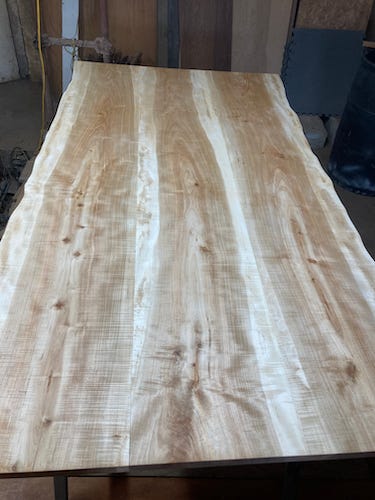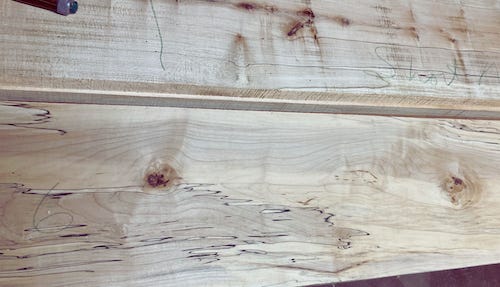A brief update: I bought a used 10” Craftsman table saw and sold my DeWalt construction saw. Actually, my partner, thanks to his mad Marketplace skills, handled finding the Craftsman and selling the DeWalt, as I don’t use social media. *cough cough* I mean, I only use it through a benevolent emissary who gets to wrap himself in the blanket of my undying devotion.
And a big thank you to my mentor, who when I told her about my new saw, gave me a cast-iron wing that someone had just happened to give to her. It feels like the universe is just raining woodworking equipment in my direction. (There I am, on the ground, arms outstretched and dodging.)
My essay is below. If you enjoy it, please click the ♡ button.
Thank you for being here—I hope you’re warm, safe, and feeling appreciated.


“Sometimes you eat the bear, sometimes the bear eats you.”
Dad said this to me as we were leaving the shop Sunday evening, except he said it like, “Sometimes you et the bar, sometimes the bar et you.” I’m not sure what the accent is, but the sentiment behind the words is easy enough to understand.
After more than a month of work, we had finally finished assembling the legs, aprons, and frame for my dining table commission and attaching the top. Which had a slight twist. We’d known this and accounted for it by making the frame heavy and rigid to pull the top flat. Except it didn’t work. The twist was so strong that one leg was 1/4” off the ground.
I’ve been sitting here trying to put words to my emotions at that point, but all descriptions feel flat. And if anything, my feelings are closer in resemblance to the table top—as in, decidedly not flat, but twisted and ill contained within the rigid frame of my body.
I recently read Kieran Setiya’s new book, Life Is Hard: How Philosophy Can Help Us Find Our Way. My way doesn’t feel particularly lost, but I enjoy these kinds of books—finding relief from chewing ideas in my mental mandibles.
Setiya, a moral philosopher, shares how philosophers have wrestled with topics core to the human condition: infirmity, grief, loneliness, failure, injustice, absurdity, and hope.
Let’s be clear: I don’t have the scholastic chops to read any primary philosophical sources. I’ve tried, found them unbearably opaque, and set them aside. Now I stick to books written for the masses.
In both this book and his earlier one, Midlife, he talked about the difference between atelic (open-ended) and telic (closed-ended) pursuits. As usual, I approached Josiah, my jovial half, for examples from his own life, and he told me that polishing shoes is telic, but dad jokes are atelic.
Repairing one thing is telic. The number of things to repair is atelic.
And in my own life, building a table is telic. Woodworking is atelic.
On the bear-eating-you days though? That dining table project feels atelic, like this open-ended beast intent on cycling me through failure, absurdity, and hope.
My mentor told me that woodworking at any kind of high level is both rewarding and maddening. One must hone perseverance alongside all the other skills.
I think the truly maddening proposition is this: in woodworking, you need to focus on individual projects with a mind toward their completion. However, single-minded focus on the finished product—the destination—is actually a focus on the future, not the present.
Setiya writes:
With telic activities, satisfaction is always in the future or the past. Your ambition is unfulfilled, and then it’s over. Worse, your engagement with what you value is self-destructive. When you pursue a cherished goal, you aim to succeed, and so to end your engagement with something good. It’s as though you’re trying to destroy a source of meaning in your life. Meanwhile, it’s projects like this that expose you to the risk of failure.
So instead focus on the process of woodworking—the journey, right? Find joy in its circuitous routes, accept that no matter how knowledgeable you become, there will ever be new problems to solve, because the number of possible unknowns is inexhaustible. Atelic.
“When you value the process, your relation to the present, and to failure, is quite different,” Setiya continues. “Because they do not aim at terminal states, atelic states are not exhaustible. Your engagement with them does not annihilate them.”
Easier in words than in actions. Easier to love the journey on some days, on some projects. Maybe the work is finding that ease despite the journey’s terrain. Sometimes I wonder if I’m becoming a woodworker or a monk.
That Sunday, the bear-eating Sunday, was a week and a half ago. In the intervening days between then and now, we took the twist out by essentially racking the table top on opposite corners and leaving it for a week. And then we added a long metal bar to act as a truss holding the frame rigid even if the top tries to revert to its previously twisted shape.
The project is complete, at least the wood part. I also have a narrative to finish writing for my clients. It’s about the history of the tree from which the table top was taken and the design and the building process. The rewards and the madness.
For me, writing is an atelic activity.
But for you, these essays are telic endeavors.
Things I’m Enjoying
Me: I want to include a section in my newsletter of stuff I’m reading that I like. But I don’t want to call it “recommendations” because I hate recommendations.
Josiah: Isn’t this newsletter getting a bit big for its britches?
Me: I’m coming to you for a name idea, not commentary.
J: Martha Stewart has a section in her magazine called “Good Things” and it’s a random list of stuff she likes, could be books, could be kitchen tools.
Me: I am like the Martha Stewart of woodworking.
J: Hmm.
____
Creative endeavors might produce different outcomes, but the path getting there has many of the same features.
wrote a list of 13 tips she learned from the book 28 Stand Ups: Best Tips, Bits, and Bombs. Falatko writes a Substack on how to get creative work done. While it’s geared toward writers, even this dusty woodworker finds it helpful.I love funny stories and funny people. It’s one of the reasons I’m with Josiah. If I’m not careful, I can get dreadfully earnest and serious. So I’ve enjoyed reading
by Michael Estrin for the past few weeks (I'm sure he was just as funny before that, but that's when I subscribed). His most recent post is about a tweet and car issues, and is a delightful way to spend a coffee break.If you would like to support my writing you can do so a couple of ways:
—by liking this post (clicking the ♡ above or below)
—by becoming a paid subscriber
—sharing this with anyone you feel would enjoy a 10-minute break every two weeks to read non-technical, semi-philosophical words on woodworking.
Thank you!











I've been following for a while and this has been my favorite essay. I recently refurbished an old butcher block workbench into a desk for a friend. I had cut it into four 6-foot long boards and jointing them back together without seems was absolutely maddening. It was my singular, frustrating focus for a week and half but once it was finally over I found myself missing the challenge. I think the telic vs. atelic concept captures my feelings brilliantly.
Hi! Thanks for posting about my tips-from-stand-ups essay! For sure it's useful to woodworking. Like if you have to, uh, rabbet a dado and, uh, like, you can't for some reason and. Yeah.